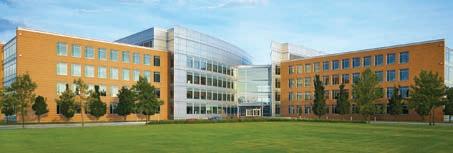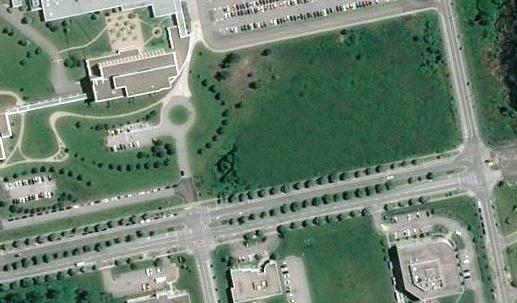
7 minute read
INTERVIEW Avi Krispine A passion for the city
AVI KRISPINE A PASSION FOR THE CITY
BY NATHALIE SAVARIA, JOURNALIST
Avi Krispine is the executive vice-president and managing director of CBRE’s activities in Québec. Immobilier commercial interviewed him on the occasion of the property brokerage firm’s ranking of North America’s top 50 cities for tech talent.
Initially, there was nothing about Avi Krispine to suggest that he would have a career in commercial real estate.
FORMATIVE YEARS
He began his professional life working in philanthropy. A job placement agency in the building where he worked approached him several times with offers from real estate firms looking for new talent. One of them captured his interest. At age 21, in 2001 he was hired by Newmark Knight Frank Devencore.
"I was hooked. I developed a passion for real estate!" he said. Avi Krispine learned everything he could about being a real estate broker, thanks in part to two mentors, Peter Picciola and Michel Sicotte. He specialized in sales and leasing of office and industrial property, and in tenant representation in the Greater Montréal area. He has fond memories of his time at Devencore. "Those five years really allowed me to acquire an excellent knowledge of commercial real estate. For the first two years I was in a mentorship program. My greatest strength was making cold calls. That was how I made my mark, being able to organize meetings with potential clients, one after another."

DECISIVE MOMENT
In 2006 his career took a new direction. Bret Miller at CBRE hired him as vice-president and director of sales and gave him a major challenge, i.e. establish a satellite office in the Montréal suburbs. "I had to build an office from scratch. The first few years I acted as a player-coach, which meant that I had to initiate and monitor real estate transactions and also manage the office. Over time, CBRE acquired a few companies. One of them was Trammell Crow. In the first three years we went from zero to some sixty employees. I was responsible not only for managing the brokerage division, but also the valuation and advisory division, and later project management as well. That allowed CBRE to consolidate its market position and to get ahead of its competitors."
His biggest challenge at the time was harmonizing the different philosophies and cultures of the three divisions so as to create a top-notch work environment. He succeeded, partly by conducting regular in-house surveys among employees.
"I listened to what they had to say and adjusted my approach. The key to success is the people you work with. They loved working there because we met their expectations. And when you have good people, they attract other talented individuals. My biggest advantage was the quality of our employees."
ISTOCK BY WARCHI
In 2016 he was named executive vice-president and managing director of CBRE in Québec. His job consists of supervising all activities and all divisions of the firm in downtown Montréal, Ville St. Laurent and Québec City. He is also a member of the CBRE national management team.
SUCCESS AND COMMITMENT
In 2017 Avi Krispine realized a cherished dream – completing his university studies, which he had begun years earlier when in the marketing program at HEC Montréal. He received an MBA in Real Estate Leadership from the University of Fredericton.
The son of parents who immigrated from Morocco in 1975, he has always felt compelled to give back not only to his community, which provided his family with assistance, but also to his city, Montréal. "For me it is very important. It’s also a way to establish genuine contact with people."
He has been a member of several boards of directors, including sitting on the Jewish General Hospital Foundation board. He has raised funds for diverse nonprofit organizations such as the Dr. Julien Foundation, the Montréal Canadiens Foundation and the Montréal Real Estate Foundation for Kids. In 2011 he received the Outstanding Volunteer award from the Association of Fundraising Professionals.
TOP TECH TALENT MARKETS - 2020
In July CBRE published its annual Scoring Tech Talent report, which lists the top 50 markets for tech talent in North America. The list focuses on the ability of tech firms to attract skilled tech workers and foster talent development.
The scorecard evaluates 13 metrics including tech talent supply, concentration, cost, completed tech degrees, perspectives for growth within the industry and in expanding markets, and also real estate costs (rental costs for offices and apartments).
Montréal dropped from No. 11 to No. 16, while Ottawa rose to 14 th place. According to Avi Krispine, this situation indicates lively competition and also reflects "numerous contracts awarded by governments to firms in the technology sector." The same phenomenon can be seen in Washington, which climbed to 2 nd place just behind the San Francisco Bay area.
MONTRÉAL, MOST AFFORDABLE TECH CITY
That being said, Montréal still has major assets. It is the least expensive among the fifty cities on the list, with both salaries and operating costs lower than figures for Vancouver, Toronto, Ottawa and Calgary.
À LOUER ESPACES DE BUREAUX
Place Innovation, 2351, boulevard Alfred-Nobel


►2311 boulevard Alfred-Nobel ► rue Alexander Fleming

Technoparc Montréal ►
►boulevard Alfred-Nobel
Station située à l’intersection de Alfred-Nobel et Alexander Fleming au coin de la Place Innovation

REM - Réseau express métropolitan
Pour les demandes de location, veuillez appeler au 514 334-4545
ISTOCK BY JANIECBROS

In Montréal, the average annual cost for a 500-person tech company leasing 75,000 sq. ft. is $40.1M CAD. The average annual salary for a tech worker is $80,579, a 14% increase since 2014. By comparison, a tech worker’s salary in Toronto is $84,989, $91,104 in Ottawa and $81,931 in Vancouver.
That salary advantage comes with a risk, however, notes Avi Krispine. "On the one hand, we love being recognized on a North American scale as the most affordable city for tech firms. On the other hand, the salaries we pay are the lowest."
Such a situation can create the perception that the quality of our tech workers is lower, whereas in fact the cost of living is lower in Montréal than in San Francisco, for example, where the average salary for tech workers is $136,060 US. As he noted, "There is an impact on what we’re able to obtain in terms of the calibre of the labour pool."
Despite all that, Montréal has a number of successful ventures to its credit. Compulsion Games, the Montréal studio of Microsoft’s Xbox Game Studios and Two K will be moving into a reconverted building at 1100 Atwater Avenue, a Kevric Real Estate project. Over the past two years, real estate agencies have concluded more than 20 major transactions in the office building sector (and many more in the industrial sector) for large tech firms like Google, IBM and Ubisoft (see sidebar story).
WHAT NEXT?
Although the pandemic persists and carries with it the threat of a second wave in the near future, what is the outlook for the tech talent market in Montréal?

Mr. Krispine is of the opinion that "the tech sector will experience a slowdown over the next 24 months. So long as there is no vaccine, companies will continue with teleworking. Revenue will be generated, but not as much as forecast when all employees worked under the same roof. It’s all linked to corporate culture. After only four or five months firms are starting to realize that there is a lack of internal communication and that many employees do not experience a feeling of belonging, both of which have a negative impact on corporate culture. As long as those factors are not resolved, it will have a direct impact on all companies with a youthful work force, as is often the case in the tech sector. Young people need to be stimulated, to feel like they are part of a firm’s business culture."
How might Montréal fare in next year’s scorecard? Given its lower salaries and the declining attractiveness of the city, plus the fact that bilingualism is required in the Québec workplace, he feels that Montréal will drop in the rankings, surpassed by Ottawa and Washington. It might be the case that tech workers, whose applications for U.S. visas are currently blocked due to Covid-19, will focus on Canada. But how many will choose Montréal rather than Toronto or Vancouver?
For Avi Krispine the current crisis in an opportunity, an ideal moment to promote Montréal as a tech centre. "While we are going through this pandemic and once the city and the province again start promoting Montréal, it is important to place emphasis on our talent and to create an advertising campaign aimed exclusively at the tech sector. There are a lot of jobs to go after. There is a niche, and we have to maximize it as much as possible. And I’m not even into tech. My passion is for my city and its potential for growth and development!"









